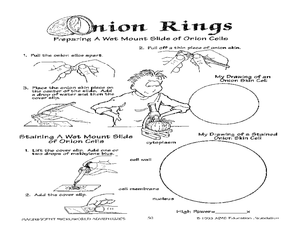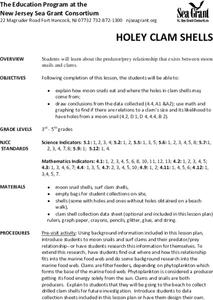National Nanotechnology Infrastructure Network
The Micro and Macro World Around Us
Don't let your eyes play tricks on you ... use scale to keep your eyes in check! Young scholars observe images without scale and try to identify the structure. Then, they look at the same image with a scale bar and assess whether their...
Curated OER
Onion Cells
Students observe the cells of an onion by wet mounting it and viewing it in a microscope. In this hands on lesson plan students make their own wet mount slide of an onion and are able to identify the cells in it such as, the...
Curated OER
Make and Use a Plankton Net
Students make simple plankton nets and use them to collect and identify common forms of plankton. They identify and interpret plankton, as seen under a microscope, whether there was more zooplankton or phytoplankton. Finally, students...
TryEngineering
What is a Nanometer?
Exactly how small is a nanometer? Scholars investigate the scale of a nanometer by measuring classroom objects and converting these measurements to nanometers.
Curated OER
The Great Archeological Dig
Learners explore biology by identifying a diagram. In this cell anatomy lesson, students read a story about archeology and conduct a fictitious archeology dig in class in which they search for animal cells. Learners define a list of...
Curated OER
Holey Clamshells
Pupils analyze data to make hypotheses and conclusions regarding the predator/prey relationship between moon snail and surf clams.
Curated OER
CSI Clamshell Investigation
Students explore predator/prey relationships. They research information on moon snails and claims. Students draw conclusions from the data collected. They use math and graphing to determine if there is a relationship to the clam's size...






